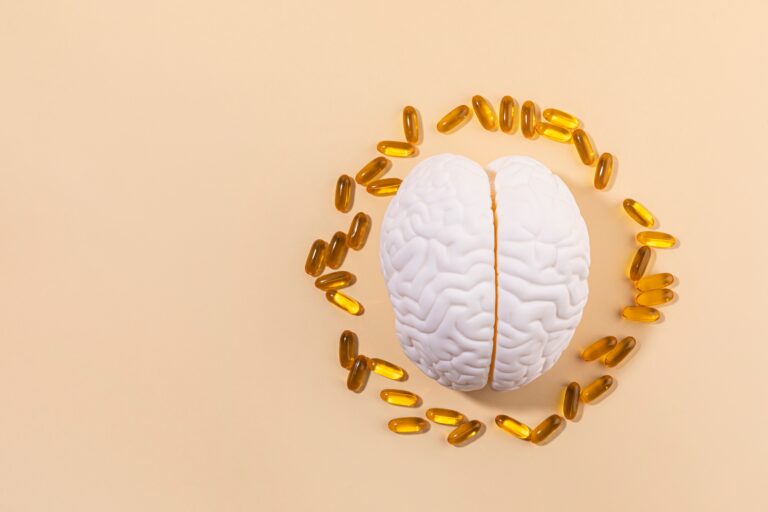What is DHA?
Fats, also called fatty acids, are one of three essential macronutrients required daily to support a variety of processes in the body. There are several types of fatty acids, such as essential fatty acids which cannot be made in the body at the quantities needed for healthy function; instead, they must be obtained by the diet to meet the body’s needs. Essential fatty acids can be further divided into categories based on their chemical structure. Omega-3 and omega-6 fatty acids are two types of essential fatty acids that have distinct biochemical differences and exert opposing effects in the body. Omega-3 fatty acids support healthy inflammation, while omega-6 fatty acids contribute to a pro-inflammatory environment.
Health Benefits of DHA
Docosahexaenoic acid, or DHA, is a type of omega-3 fatty acid. It can be found in fish, shellfish, fish oils, and can be synthesized from other omega-3 fatty acids found in certain nuts, including walnuts. DHA is an important component of cell structure, affects cellular signaling, and is involved in neurotransmitter action.1 Other health benefits of DHA include supporting cardiovascular health, enhancing cognitive function, promoting healthy inflammation, decreasing triglyceride levels, and supporting healthy blood pressure levels.2
Brain health
DHA is required for proper fetal brain development, with rapid accumulation during the last trimester of pregnancy and the first two years after birth; DHA continues to accumulate through adolescence but at a slower rate.3,4 DHA in breastmilk supports brain development in infants, and supplementation with DHA during pregnancy and lactation has been related to visual and mental development and improved cognitive abilities.3,5
As children grow up, DHA remains important for brain function. It is found at high levels in parts of the brain that are responsible for planning, problem-solving, and focused attention.6 Because the brain is constantly being remodeled as old cells die and new cells are generated, it requires a constant supply of DHA and other essential nutrients for healthy brain maintenance.3 Healthy DHA consumption throughout life may also help lower the risk of developing Alzheimer’s’ disease as an important part of neurons in the brain and due to its anti-inflammatory effects, however more research is needed.7
Because most Americans do not consume enough DHA, supplementation with DHA and other omega-3 fatty acids is an excellent option for ensuring adequate intake. In order to see significant elevations in blood DHA levels, supplementation for about one to three months is required.8
DHA Deficiency
A diet lacking in DHA can cause health problems throughout the lifespan. If pregnant women do not consume enough DHA, it may result in slow or impaired development of language learning skills, affect behavior in children, and influence disease risk later in life.3 There also appears to be a critical window for correcting maternal DHA deficiency.3 For teenagers and adults, DHA deficiency has been related to autism spectrum disorder (ASD), attention-deficit/hyperactivity disorder (ADHD), cognitive issues, memory problems, and depression later in life.3
- Mora, I., Arola, L., Caimari, A., Escoté, X., Puiggròs, F. (2022). Structured Long-Chain Omega-3 Fatty Acids for Improvement of Cognitive Function during Aging. Int J Mol Sci, 23:3472.
- Horrocks, L.A., Yeo, Y.K. (1999). Health benefits of docosahexaenoic acid (DHA). Pharmacol Res, 40(3):211.
- Basak, S., Mallick, R., Banerjee, A., Pathak, S., Duttaroy, A.K. (2021). Maternal Supply of Both Arachidonic and Docosahexaenoic Acids Is Required for Optimal Neurodevelopment. Nutrients, 13(6):2061.
- Brown, T.T., Jernigan, T.L. (2012). Brain development during the preschool years. Neuropsychol Rev,22:313.
- Lauritzen, L., Brambilla, P., Mazzocchi, A., Harsløf, L.B.S., Ciappolino, V., Agostini, C. (2016). DHA Effects in Brain Development and Function. Nutrients, 8(1):6.
- McNamara, R.K., Carlson, S.E. (2006). Role of Omega-3 Fatty Acids in Brain Development and Function: Potential Implications for the Pathogenesis and Prevention of Psychopathology. Prostaglandins Leukot Essent Fatty Acids, 75:329.
- Swanson, D., Block, R., Mousa, S.A. (2012). Omega-3 Fatty Acids EPA and DHA: Health Benefits Throughout Life. Adv Nutr, 3:1.
- Zirpoli, H., Chang, C.L., Carpentier, Y.A., Michael-Titus, A.T., Ten, V.S., Deckelbaum, R.J. (2020). Novel Approaches for Omega-3 Fatty Acid Therapeutics: Chronic Versus Acute Administration to Protect Heart, Brain, and Spinal Cord. Annu Rev Nutr, 40:161.







